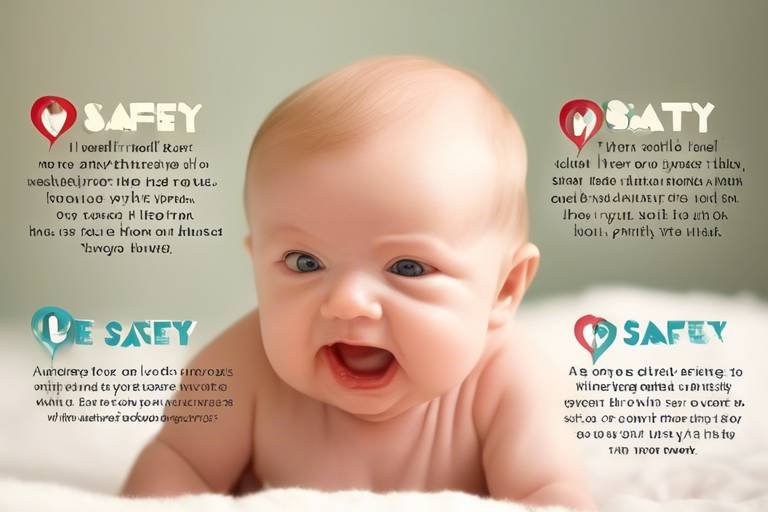Identifying Common Eating Disorders in Teens: A Guide for Parents
As parents, it's natural to worry about our teens. The teenage years are a tumultuous time filled with changes, challenges, and pressures that can sometimes lead to serious issues like eating disorders. Identifying these disorders early can make a world of difference in a teen's recovery journey. In this guide, we aim to equip you with the knowledge to recognize the signs of common eating disorders, understand their implications, and foster an environment that encourages open dialogue about these sensitive topics.
Eating disorders are not just about food; they are complex mental health conditions that can have profound effects on a teen's physical and emotional well-being. These disorders often stem from a combination of genetic, environmental, and psychological factors. When we think about eating disorders, it’s important to remember that they can affect anyone, regardless of gender, background, or body type. The sooner you can recognize the signs, the sooner you can intervene and provide support. Awareness is key!
Among teenagers, the most prevalent eating disorders include anorexia nervosa, bulimia nervosa, and binge eating disorder. Each of these disorders has its own unique characteristics and symptoms, making it crucial for parents to be informed. Let’s take a closer look at these disorders:
Anorexia nervosa is a serious condition characterized by extreme weight loss and an intense fear of gaining weight. It's more than just a desire to be thin; it's often rooted in deep-seated emotional issues. Recognizing the symptoms of anorexia is essential for parents. If your teen is exhibiting behaviors such as avoiding meals, expressing excessive concern about their weight, or engaging in extreme exercise routines, these could be warning signs.
- Drastic weight loss
- Preoccupation with food, dieting, and body size
- Excessive exercise
- Withdrawal from social activities
- Physical signs such as hair loss and fatigue
The health implications of anorexia are severe and can include heart problems, bone density loss, and hormonal imbalances. This is why it’s crucial for parents to understand the urgency of seeking help. The longer the disorder persists, the more challenging it can be to treat. Don’t wait for the situation to escalate!
Bulimia nervosa involves cycles of binge eating followed by purging, either through vomiting, excessive exercise, or the use of laxatives. This cycle can be incredibly damaging, both physically and emotionally. Parents should be on the lookout for signs such as secretive eating habits, frequent trips to the bathroom after meals, or dramatic fluctuations in weight.
Binge eating disorder is characterized by episodes of excessive eating without the purging behaviors seen in bulimia. Teens with this disorder often struggle with feelings of guilt and shame after bingeing, which can lead to a vicious cycle of emotional eating. Understanding the emotional toll of binge eating is essential for parents, as it can help you approach the situation with compassion and care.
Understanding the emotional triggers behind eating disorders can significantly improve how you communicate with your teen. Many teens may feel overwhelmed by societal pressures to look a certain way, or they might be dealing with personal issues that manifest as unhealthy eating behaviors. By fostering open communication, you create a safe space for your teen to express their struggles and feelings.
It’s vital for parents to know when to seek professional help. If you notice concerning behaviors or signs of an eating disorder, don’t hesitate to reach out to healthcare providers. Early intervention can dramatically improve outcomes for teens facing these challenges. Remember, you are not alone in this journey; many professionals specialize in treating eating disorders and can provide the necessary support for both you and your teen.
Q: What should I do if I suspect my teen has an eating disorder?
A: Start by having an open and honest conversation with your teen. Express your concerns without judgment and encourage them to seek professional help.
Q: How can I support my teen during recovery?
A: Be there for them emotionally, listen without judgment, and encourage healthy habits. It’s also important to educate yourself about their condition.
Q: Are eating disorders common among teens?
A: Yes, eating disorders are increasingly common among teenagers due to various factors, including social pressures, mental health issues, and family dynamics.
Q: Can eating disorders be treated?
A: Absolutely! With the right treatment and support, many teens can recover from eating disorders and lead healthy, fulfilling lives.

Understanding Eating Disorders
Eating disorders are not just about food; they are complex mental health conditions that intertwine with emotional and psychological factors. For many teenagers, the pressures of adolescence can lead to unhealthy relationships with food and body image. It's essential for parents to understand that these disorders are serious and can have profound effects on a teen's physical and emotional well-being. Recognizing the signs early can make a significant difference in the outcome. The earlier a problem is identified, the sooner effective intervention can occur.
Adolescence is a tumultuous time filled with changes. Teens are often bombarded with societal pressures, peer influences, and the relentless pursuit of an ideal body image. These factors can trigger unhealthy behaviors, leading to eating disorders. It's crucial for parents to be aware of the emotional turmoil their teens may be experiencing, as this can manifest in various ways, including changes in eating habits, mood swings, and social withdrawal.
Eating disorders can take many forms, and each has its unique characteristics. Understanding these disorders involves recognizing the symptoms and knowing how they can affect a teen's life. It’s not just about the physical signs; emotional and psychological aspects play a significant role. For example, a teen struggling with an eating disorder may exhibit signs of anxiety, depression, or low self-esteem, which can further complicate the situation.
To help parents better understand the landscape of eating disorders, here’s a brief overview of some common types:
| Type of Eating Disorder | Characteristics |
|---|---|
| Anorexia Nervosa | Extreme weight loss, intense fear of gaining weight, and a distorted body image. |
| Bulimia Nervosa | Cycles of binge eating followed by purging through vomiting, excessive exercise, or fasting. |
| Binge Eating Disorder | Regular episodes of excessive eating without subsequent purging behaviors. |
As parents, it’s vital to create an environment where open communication is encouraged. This means fostering a space where teens feel safe discussing their feelings about food, body image, and any pressures they may face. By doing so, parents can help their teens navigate these challenges more effectively and reduce the stigma surrounding eating disorders.
In conclusion, understanding eating disorders is the first step toward supporting teens who may be struggling. With empathy, awareness, and timely intervention, parents can play a pivotal role in their teen's journey toward recovery.

Types of Eating Disorders
Eating disorders are not just about food; they are complex issues that intertwine with emotions, mental health, and societal pressures. For parents, understanding the types of eating disorders that commonly affect teenagers is crucial in order to recognize the signs and offer timely support. The three most prevalent eating disorders among teens include anorexia nervosa, bulimia nervosa, and binge eating disorder. Each of these disorders has its own unique characteristics and symptoms, making it essential for parents to be aware of them.
Anorexia nervosa is often characterized by an overwhelming fear of gaining weight, leading to extreme weight loss and a distorted body image. Teens may engage in restrictive eating habits and excessive exercise. It's as if they are trapped in a mirror that reflects a body they perceive as overweight, even when they are dangerously underweight. This disorder can manifest in various ways, such as:
- Severe calorie restriction
- Excessive focus on food and dieting
- Social withdrawal
On the other hand, bulimia nervosa involves a cycle of binge eating followed by purging behaviors, such as vomiting or excessive exercise. This disorder can create a rollercoaster of emotions, where teens may feel a temporary relief after purging but ultimately experience guilt and shame. The binge-purge cycle can be difficult to detect, as it often occurs in secrecy. Parents should look for signs such as:
- Frequent trips to the bathroom after meals
- Changes in weight
- Discoloration of teeth due to acid exposure
Lastly, binge eating disorder is marked by episodes of consuming large quantities of food without subsequent purging. This disorder is often accompanied by feelings of loss of control and emotional distress. Unlike bulimia, those with binge eating disorder do not engage in compensatory behaviors, which can lead to weight gain and associated health issues over time. It’s important for parents to recognize that binge eating is not simply overeating; it is a serious condition that requires understanding and compassion.
By being aware of these types of eating disorders, parents can create an environment of open communication and support. Understanding that these disorders stem from a combination of psychological, emotional, and social factors can help parents approach their teens with empathy. Remember, the sooner these disorders are recognized and addressed, the better the chances are for recovery.

Anorexia Nervosa
Anorexia nervosa is more than just a desire to be thin; it’s a complex mental health disorder that grips teenagers in a vice of fear and obsession. Imagine a young person who feels that their self-worth is tied to a number on the scale. This intense fear of gaining weight can lead them to engage in extreme behaviors that are not only harmful but also life-threatening. Parents must be equipped with the knowledge to recognize the signs of this disorder early on, as timely intervention can be a game-changer in a teen’s recovery journey.
The symptoms of anorexia nervosa can manifest in various ways, and being aware of these can help parents identify potential issues. Common signs include:
- Drastic Weight Loss: A noticeable drop in weight that is often alarming.
- Preoccupation with Food: An obsession with calorie counting, dieting, or cooking food for others but refusing to eat themselves.
- Excessive Exercise: Engaging in rigorous physical activity to burn calories, often at the expense of their health.
- Social Withdrawal: Avoiding social situations, particularly those involving food.
The impact of anorexia on health is staggering. It’s not just about weight loss; the effects ripple through the body and mind. For instance, individuals with anorexia are at risk for serious complications, including:
| Health Complication | Description |
|---|---|
| Heart Problems | Irregular heartbeats and heart failure due to malnutrition. |
| Bone Density Loss | Osteoporosis and increased risk of fractures due to lack of essential nutrients. |
| Gastrointestinal Issues | Constipation, bloating, and other digestive problems from inadequate food intake. |
For parents, understanding these risks is crucial. It’s not merely about encouraging a healthy diet; it’s about recognizing the urgency of seeking help when you see the warning signs. The psychological grip of anorexia can be incredibly strong, and without proper support, it can lead to devastating outcomes. Parents should foster an environment of open communication, where their teens feel safe discussing their feelings and struggles. Remember, addressing these issues with love and understanding can pave the way for recovery.

Signs and Symptoms of Anorexia
Recognizing the signs and symptoms of anorexia nervosa is crucial for parents who want to support their teens effectively. This eating disorder often manifests in subtle ways, making it essential for parents to be vigilant. One of the most alarming signs is a drastic weight loss that seems disproportionate to the teen's eating habits. You might notice your child becoming increasingly secretive about their meals or avoiding social gatherings that involve food. This behavior can be a red flag, indicating a deeper struggle with body image and self-worth.
Another common symptom is an intense preoccupation with food, dieting, and body shape. If your teen frequently talks about calories, fat content, or expresses dissatisfaction with their body, it’s time to take notice. They may also develop rituals around food, such as cutting their meals into tiny pieces or refusing to eat in front of others. These behaviors often stem from an overwhelming fear of gaining weight, which can lead to extreme measures like excessive exercise or even the use of laxatives.
In addition to these behavioral signs, watch for emotional indicators as well. Teens with anorexia may experience mood swings, irritability, or withdrawal from friends and family. They might also exhibit signs of depression or anxiety, which can further complicate their relationship with food and their body. It’s important to approach these situations with empathy and understanding, rather than judgment. After all, your teen might be struggling with feelings of inadequacy and fear that are hard to articulate.
Here’s a quick summary of some key signs and symptoms to look out for:
- Drastic Weight Loss: Significant changes in weight over a short period.
- Food Preoccupation: Constantly talking about food, dieting, or calories.
- Social Withdrawal: Avoiding situations where food is present.
- Excessive Exercise: Engaging in intense workouts to burn calories.
- Mood Changes: Increased irritability, anxiety, or depression.
If you suspect your teen is showing signs of anorexia, it’s essential to take action. Early intervention can make a significant difference in their recovery journey. Encourage open dialogue about their feelings and concerns, and let them know you’re there to support them without judgment. Remember, the goal is to foster a safe environment where they feel comfortable discussing their struggles.
Q: What should I do if I suspect my teen has anorexia?
A: The first step is to approach your teen with care and empathy. Start a conversation about their eating habits and feelings without being confrontational. It may also be beneficial to seek advice from a healthcare professional who specializes in eating disorders.
Q: Can anorexia be treated?
A: Yes, anorexia is treatable. Early intervention is critical, and treatment often involves a combination of therapy, nutritional counseling, and sometimes medication.
Q: How can I support my teen during recovery?
A: Offer emotional support and encourage them to express their feelings. Help them set realistic goals and celebrate small achievements in their recovery journey.

Impact of Anorexia on Health
Anorexia nervosa is not just a phase or a diet gone too far; it’s a serious mental health condition that can wreak havoc on a teen's body. The impact of anorexia on health can be both immediate and long-lasting, affecting various systems in the body. When a teenager restricts their food intake to the point of severe weight loss, they are not only battling with their self-image but also putting their physical health at serious risk. Imagine a car running on empty; eventually, it will break down. Similarly, when the body lacks essential nutrients, it begins to fail.
One of the most alarming consequences of anorexia is the effect it has on the heart. The heart muscle can weaken significantly when the body is deprived of calories and essential nutrients. This can lead to a condition known as bradycardia, where the heart rate drops dangerously low. In severe cases, this can result in heart failure, which is life-threatening. Additionally, the electrolyte imbalances caused by inadequate nutrition can lead to irregular heartbeats, further complicating the situation.
Moreover, the bones are not spared either. Anorexia can lead to decreased bone density, making teens more susceptible to fractures and osteoporosis later in life. This is particularly concerning because the teenage years are critical for bone development. When a teen doesn’t get enough calcium and vitamin D, their bones can become fragile, akin to a house built on a shaky foundation. The long-term implications of weakened bones can be devastating.
Another area of concern is the digestive system. Prolonged starvation can slow down the digestive process, leading to constipation and bloating. The body, in its effort to conserve energy, can also start to break down muscle tissue for fuel, which is counterproductive and harmful. This can lead to a cycle of fatigue and weakness, making it difficult for teens to engage in everyday activities.
Additionally, anorexia can severely impact mental health. The lack of proper nutrition can exacerbate feelings of anxiety and depression, creating a vicious cycle that is difficult to escape. Teens may find themselves trapped in a spiral of negative thoughts about their body image, which can lead to further restrictive eating behaviors. It’s crucial for parents to recognize these signs early and understand that the emotional and psychological toll of anorexia is just as significant as the physical effects.
In summary, the impact of anorexia on health is multifaceted and can lead to severe complications that require immediate attention. Parents should be vigilant and proactive, understanding that the sooner they intervene, the better the chances are for their teen's recovery. Seeking professional help is essential, as healthcare providers can offer tailored support and treatment options that address both the physical and psychological aspects of this disorder.
| Health Impact | Description |
|---|---|
| Heart Problems | Risk of bradycardia and heart failure due to nutrient deficiency. |
| Bone Density Loss | Increased risk of fractures and osteoporosis from lack of calcium and vitamin D. |
| Digestive Issues | Constipation and bloating due to slowed digestive processes. |
| Mental Health | Exacerbation of anxiety and depression, leading to a cycle of negative thoughts. |
- What are the early signs of anorexia? Early signs include drastic weight loss, preoccupation with food, and excessive exercise.
- How can parents help a teen with anorexia? Open communication and seeking professional help are crucial steps for parents to take.
- Is anorexia treatable? Yes, with early intervention and appropriate treatment, many individuals recover from anorexia.

Bulimia Nervosa
Bulimia nervosa is a serious eating disorder that affects many teenagers, often manifesting through a cycle of binge eating followed by compensatory behaviors such as purging. This disorder is not just about food; it often stems from deep-seated emotional issues and a relentless pursuit of control. Imagine feeling trapped in a storm where food becomes both a source of comfort and a trigger for overwhelming guilt. Teens may feel as though they are riding a rollercoaster of emotions, where highs come from indulgence and lows from subsequent purging.
Recognizing bulimia in teens can be challenging, as those affected often go to great lengths to hide their behaviors. They may appear to maintain a normal weight, which can make it difficult for parents to spot the signs. However, some common indicators include:
- Frequent trips to the bathroom: After meals, they may excuse themselves to purge.
- Changes in eating patterns: This might include secretive eating or sudden avoidance of certain foods.
- Physical signs: Look out for dental issues, swollen cheeks, or calluses on knuckles from inducing vomiting.
Bulimia can lead to severe health complications, both physically and emotionally. Physically, it can result in electrolyte imbalances, which can cause heart problems, gastrointestinal issues, and severe dehydration. Emotionally, the cycle of bingeing and purging can lead to feelings of shame, anxiety, and depression. It’s like being caught in a vicious cycle that feels impossible to escape.
Parents play a crucial role in identifying and addressing bulimia. Open communication is key. If you suspect your teen is struggling, approach the topic with empathy and understanding. Instead of confronting them with accusations, create a safe space for them to share their feelings. This can be a pivotal moment in their recovery journey.
In summary, bulimia nervosa is a complex disorder that requires attention and understanding. By recognizing the signs and fostering open dialogue, parents can provide the necessary support that their teens need to navigate these turbulent waters.
Q: What are the main causes of bulimia nervosa?
A: Bulimia can be caused by a combination of genetic, environmental, and psychological factors. Stress, trauma, and societal pressures regarding body image can also contribute significantly.
Q: How can I help my teen if I suspect they have bulimia?
A: Start by having an open and honest conversation. Express your concerns without judgment and encourage them to seek professional help. Support from family is crucial in their recovery.
Q: Is bulimia curable?
A: Yes, with the right treatment and support, many individuals can recover from bulimia. Treatment often involves therapy, nutritional counseling, and sometimes medication.

Binge Eating Disorder
Binge Eating Disorder (BED) is a serious condition that affects many teenagers, often leading to a cycle of emotional distress and unhealthy eating habits. Unlike other eating disorders, BED is characterized by episodes of consuming large quantities of food in a short period, often accompanied by feelings of loss of control and guilt. Imagine being at a party where the buffet is overflowing with delicious food, and instead of enjoying it in moderation, you find yourself mindlessly eating until you feel uncomfortably full. This is a glimpse into the world of binge eating, and it can be a distressing experience for those who struggle with it.
One of the most challenging aspects of BED is that it often goes unnoticed. Many teens may binge eat in secret, hiding their behavior from family and friends. This secrecy can create a barrier to seeking help, as the teen may feel ashamed or embarrassed. As a parent, it’s crucial to foster an environment of openness and trust, allowing your teen to feel safe discussing their eating habits without fear of judgment. Remember, the goal is to create a supportive space where they can express their feelings and struggles.
Recognizing the signs of binge eating can be a game-changer. Here are some common indicators that may suggest your teen is struggling with BED:
- Frequent episodes of eating large amounts of food in one sitting.
- Eating rapidly during binge episodes.
- Hiding food or eating in secret.
- Feeling distressed or upset after binge eating.
- Using food as a coping mechanism for stress or emotional issues.
It's important to note that binge eating is not simply about the act of eating; it often stems from deeper emotional and psychological issues. Many teens who experience BED may also be dealing with anxiety, depression, or low self-esteem. Understanding these underlying factors is essential for parents who want to help their children navigate these turbulent waters. It’s like peeling an onion; each layer reveals more about what’s really going on beneath the surface.
Addressing binge eating disorder requires a compassionate approach. Encouraging healthy eating habits, while also promoting a positive body image, can make a significant difference. Instead of focusing solely on weight, emphasize the importance of overall health and well-being. Engage your teen in discussions about nutrition and physical activity in a way that feels empowering rather than punitive. Think of it as building a healthy relationship with food, where it’s not just about what’s on the plate but also about how food makes them feel.
In some cases, professional help may be necessary. Therapy, particularly cognitive-behavioral therapy (CBT), has shown promising results for teens with BED. It can help them identify the triggers that lead to binge eating and develop healthier coping strategies. If you suspect your teen is struggling with binge eating, don’t hesitate to reach out to a healthcare provider who specializes in eating disorders. Early intervention can pave the way for recovery and a healthier relationship with food.
Ultimately, as a parent, your support and understanding can be a lifeline for a teen grappling with binge eating disorder. By recognizing the signs, fostering open communication, and seeking professional help when needed, you can help your teen navigate their journey towards recovery and a healthier lifestyle.
1. What is the difference between binge eating disorder and overeating?
Binge Eating Disorder involves recurrent episodes of eating large amounts of food accompanied by a feeling of loss of control, while overeating can occur occasionally and does not necessarily involve the same emotional distress.
2. How can I help my teen if they are struggling with BED?
Encourage open communication, foster a supportive environment, and seek professional help if necessary. Being empathetic and understanding can go a long way in helping your teen feel safe.
3. Is binge eating disorder common among teens?
Yes, BED is one of the most common eating disorders among teenagers, affecting both boys and girls.
4. What are the long-term effects of untreated binge eating disorder?
Untreated BED can lead to obesity, diabetes, heart disease, and mental health issues such as depression and anxiety.

Emotional and Psychological Factors
Understanding the emotional and psychological factors behind eating disorders is crucial for parents who want to support their teens effectively. These disorders often arise from a complex interplay of various issues, including low self-esteem, anxiety, depression, and societal pressures. Imagine a teenager standing at the edge of a cliff, looking down at a turbulent sea of expectations, peer pressure, and self-doubt. The struggle to maintain an ideal body image can feel overwhelming, leading them to resort to unhealthy eating behaviors as a coping mechanism.
Many teens experience intense feelings of inadequacy, often fueled by unrealistic standards portrayed in social media and popular culture. They might think, "If I don't look like that model, I won't be accepted." This constant comparison can spiral into a vicious cycle of negative thoughts and behaviors. It's essential for parents to recognize these emotional triggers and approach the conversation with empathy and understanding. Instead of dismissing their feelings, parents should validate their experiences, letting them know that it's okay to feel overwhelmed and that they are not alone in their struggles.
Additionally, factors such as family dynamics and past traumas can play a significant role in the development of eating disorders. For instance, a teen who has experienced bullying or has a family history of mental health issues may be more susceptible to these disorders. It’s important for parents to create a safe space for their teens to express their emotions and discuss any underlying issues that might be contributing to their eating behaviors. Open communication can foster trust and encourage teens to seek help when needed.
Moreover, the stigma surrounding mental health can prevent many teens from speaking up about their struggles. They might fear judgment or feel embarrassed about their condition, which can exacerbate feelings of isolation. Parents should be proactive in educating themselves about eating disorders and promoting mental health awareness within the family. This knowledge can empower them to recognize the signs and symptoms early, allowing for timely intervention.
In summary, emotional and psychological factors are at the core of many eating disorders. By understanding these complexities, parents can better support their teens in navigating their challenges. It's not just about food; it's about feelings, identity, and the desire for acceptance. Parents should approach this topic with compassion and an open heart, ready to listen and help their teens find healthier coping mechanisms.
- What are the most common emotional triggers for eating disorders in teens?
Common emotional triggers include low self-esteem, anxiety, depression, and societal pressures to conform to certain body standards.
- How can parents create an open dialogue with their teens about eating disorders?
Parents can foster open communication by being approachable, listening without judgment, and validating their teen's feelings and experiences.
- When should a parent seek professional help for their teen?
If a parent notices significant changes in their teen’s eating habits, weight, or emotional well-being, it is crucial to seek professional help as soon as possible.

Seeking Professional Help
When it comes to eating disorders, the stakes are incredibly high, and as a parent, knowing when to seek professional help can make all the difference. You might be wondering, "How do I know if my teen's eating habits are serious enough to warrant professional intervention?" This is a valid concern, as early detection and treatment can lead to better outcomes. If your teen exhibits a combination of the signs mentioned earlier, such as drastic weight changes, secretive eating behaviors, or emotional distress surrounding food, it’s crucial to act swiftly.
Many parents feel overwhelmed by the prospect of reaching out for help. The first step is to consult with a healthcare provider who specializes in eating disorders. This could be a pediatrician, a psychologist, or a registered dietitian who understands the complexities involved. They can provide a thorough assessment and recommend a tailored treatment plan. Remember, you are not alone in this journey; many families have faced similar challenges and have found their way through.
It's important to consider that seeking help doesn't just mean therapy or medical intervention; it also involves creating a supportive environment at home. Open communication is key. Encourage your teen to express their feelings about food and body image. This can be a daunting task, but it’s essential for building trust. You might say something like, "I’ve noticed you’ve been feeling down lately. I’m here to listen if you want to talk about it." This simple invitation can open the door to deeper conversations.
Here are a few signs that indicate it’s time to seek professional help:
- Persistent Preoccupation: If your teen is constantly talking about food, weight, or body image, it may signal deeper issues.
- Physical Symptoms: Noticeable weight loss, fatigue, or other physical health concerns should never be ignored.
- Emotional Distress: If your teen shows signs of anxiety, depression, or mood swings related to their eating habits, it’s a red flag.
In addition to individual therapy, family therapy can also be beneficial. This approach not only helps the teen but also educates the family on how to support their loved one effectively. It’s a collaborative effort that can strengthen family bonds and create a healthier home environment.
Lastly, remember that recovery is a journey, not a sprint. It takes time, patience, and a lot of love. Celebrate small victories along the way, and don’t hesitate to lean on support groups for both you and your teen. These communities can provide invaluable resources and understanding that can lighten the load.
| Question | Answer |
|---|---|
| What are the first signs of an eating disorder? | Common signs include drastic weight changes, preoccupation with food, and changes in mood or behavior related to eating. |
| How can I approach my teen about their eating habits? | Start with open-ended questions and express your concern without judgment. Let them know you are there to listen. |
| Is therapy necessary for all teens with eating disorders? | While not every case requires therapy, professional help is highly recommended for effective recovery. |
| What role can parents play in the recovery process? | Parents can provide emotional support, encourage open communication, and help create a healthy home environment. |
Frequently Asked Questions
- What are the most common eating disorders in teens?
The most common eating disorders among teenagers include Anorexia Nervosa, Bulimia Nervosa, and Binge Eating Disorder. Each disorder has its own unique symptoms and challenges, making it crucial for parents to be aware of these conditions to provide the right support.
- How can I recognize if my teen has an eating disorder?
Recognizing an eating disorder can be tricky, but some signs to look out for include drastic weight loss, changes in eating habits, excessive exercise, and preoccupation with body image. If your teen is showing these behaviors, it’s important to approach the situation with care and concern.
- What should I do if I suspect my teen has an eating disorder?
If you suspect your teen is struggling with an eating disorder, the first step is to have an open and honest conversation with them. Express your concerns without judgment and encourage them to seek professional help. Early intervention can lead to better outcomes.
- Are eating disorders purely about food and weight?
No, eating disorders are complex mental health issues that often stem from emotional and psychological factors, such as anxiety, depression, or societal pressures. Understanding these underlying issues is essential for effective support and treatment.
- How can I support my teen during their recovery?
Supporting a teen during recovery involves creating a safe and understanding environment. Encourage open communication, educate yourself about their disorder, and consider involving a mental health professional to guide both you and your teen through the recovery process.
- When should I seek professional help for my teen?
If your teen exhibits severe signs of an eating disorder, such as significant weight loss, health complications, or emotional distress, it’s crucial to seek professional help immediately. Don’t wait for the situation to worsen; early intervention can make a significant difference.
- Can eating disorders be treated effectively?
Yes, eating disorders can be treated effectively with a combination of therapy, nutritional education, and medical support. The earlier the treatment begins, the better the chances of recovery, so don’t hesitate to reach out for help.



















